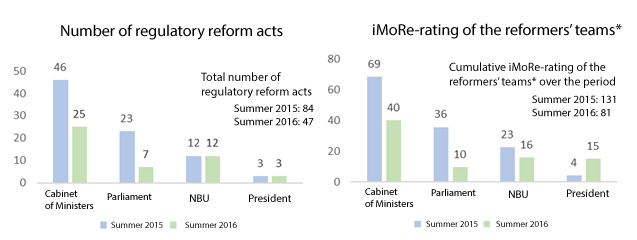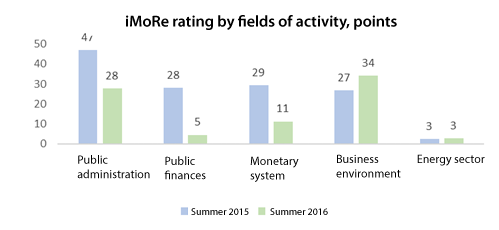Based on Reform Index, this summer the pace of economic reforms was twice lower than last summer. The Cabinet of Ministers was the most active in initiating pro-reform legislation, followed by the National Bank of Ukraine, while the President and the Parliament were ranked third and fourth respectively. The list of the most important pro-reform legal acts published this summer include amendments to the Constitution of Ukraine on judicial system, the law “On the Judicial System and Status of Judges”, improvement of corporate governance of state enterprises, introduction of private enforcement of court decisions, reduction of power of the State Fiscal Service to initiate criminal investigations, establishing of the National Repository of the Academic Texts, and simplification of drugs registration procedures.
Reform Index rating of the reformers’ teams of this and past summers
Summer is the traditional time for holidays and vacations, but definitely not a reason to postpone reforms. According to Reform Index, which tracks changes in Ukraine’s legislation, summer period accounted for 25% of all pro-reform laws and decrees adopted last year. The most important of them included the Law on National Police, opening of state registers, introduction of international audit of state companies, and a number of legislative changes aimed at reforming the energy sector and strengthening NBU independence.
Compared to last year there was a notable change in one of the teams pushing reforms forward ― the Cabinet of Ministers headed by Volodymyr Groysman replaced the Cabinet of Ministers headed by Arseniy Yatsenyuk, while the Parliament, the Presidential Administration, and the National Bank continued to advance reforms with virtually unchanged teams. Let’s see what the reformers managed to accomplish this summer, and compare their results with last year’s figures.
According to Reform Index, 47 pro-reform legal acts were approved this summer. This is twice lower than 84 documents adopted last summer. Among initiators, Parliament showed the largest slowdown: MPs initiated three times less pro-reform bills compared to last year (Figure 1). The Cabinet of Ministers headed by Volodymyr Groysman worked slower than its predecessor, initiating twice less pro-reform legislation than last year. The number of legal acts initiated by the NBU and the President remained unchanged.
Figure 1. Pro-reform legal acts initiated by various state government bodies
* Reform Index rating of a team was calculated as the sum of scores assigned to each legal act initiated by this team. Only legal acts published during the mentioned periods were included in the calculation. Source: Reform Index database, rada.gov.ua.
Of course, the number of adopted legislative acts is only part of the story. What’s more important is the content and scale of introduced changes, that is their potential impact on the overall reform progress (assuming full-fledged implementation).
To assess activity of each initiator, we created Reform Index rating of reformers using a simple technique. According to Reform Index methodology, each legislative document has been already assessed by experts on a scale of -5.0 to 5.0 points (depending on its content and scale) along several lines. If a document influences several areas, its overall score might exceed 5.0 points. Summing up scores of all pro-reform legal acts initiated by a particular team of reformers gives the score “earned” by the them (Figure 1).
The Cabinet of Ministers was the most active reformer this summer, with its Reform Index rating at 40 points, followed far behind by the NBU (16 points), while the President with 15 points and the Parliament with 10 points were ranked third and fourth respectively.
Summer Reform Index rating of the Cabinet of Ministers headed by Volodymyr Groysman (40 points) is almost twice lower than the rating of the previous team (69 points). 25 pro-reform legal acts initiated by the Cabinet were published this summer compared to 46 last summer. Among the important initiatives of the Cabinet headed by Groysman was the Naftogaz restructuring plan (Reform Index rating ― 4.8 points), the law “On State Owned Enterprises Governance Reform” (4.3 points), and reduction of power of the State Fiscal Service to initiate criminal investigations (4 points). Last summer, the Cabinet of Ministers headed by Arseniy Yatsenyuk initiated the law On National Police (4 points), lifted the moratorium on the sale of property of the Naftogaz debtors (4 points), and agreed on a unified tariff setting in the housing and utilities services (3.5 points).
The team of the National Bank of Ukraine initiated the same number of legal acts as last year (12), but their impact on the pace of reforms is lower: Reform Index rating of the National Bank this summer stood ta 16 points, down from 23 points. This summer, the NBU was engaged mainly in gradual deregulation and liberalisation in monetary and credit sphere. The regulator allowed banks to use electronic forms of documents when controlling import and export operations (2 points), limited banks’ ability to lend insolvent companies (2 points), and allowed banks to change currency exchange rates during working hours (1.5 points). Meanwhile, several systemic legal acts were approved last year: the independence of the NBU was strengthened (3 points), requirements for business reputation of owners and bank managers were increased (2.8 points), and access of international payment systems to the market of Ukraine was simplified (2.8 points).
Reform Index rating of the President this summer has increased almost fourfold, from 4 to 15 points, thanks to several laws that gave start to judicial system reform . Reform Index experts highly assessed the following bills initiated by the President: amendment to the Constitution of Ukraine on judicial system (Reform Index rating ― 5.5 points), the law “On the Judicial System and Status of Judges” (5.5 points), and the introduction of private enforcement of court decisions (4 points).
Unlike the Presidential rating, Reform Index rating of the Parliament dropped fourfold this summer; MPs initiated fewer laws, and these laws were less significant in promoting reforms. Only 7 pro-reform laws initiated by the deputies were approved (and published) this summer compared to 23 laws last summer. Among the the most important bills were the law on the introduction of ProZorro for defense procurement (Reform Index rating ― 2 points), cancelling of compulsory state registration of foreign investment (2 points), and increasing penalties for DUI (2 points). Last summer’s most important initiatives include the law on opening of registers (4 points), softening of the law on transfer pricing (3 points), the law enabling term deposits without the possibility of early withdrawal (2.8 points), amendments to the Tax Code to reduce the burden on business (2.8 points) and others.
The pace of reforms varies considerably depending across areas (Figure 2). This summer saw significant progress of the business environment, with a 1.3 increase of Reform Index rating of pro-reform legal acts affecting this area. This was achieved primarily thanks to the progress in the area of deregulation (simplification of the registration of medicines, cancelling of compulsory state registration of foreign investments, allowing banks to use e-forms of documents while controlling import and export operations, etc.) and the potential improvement in property rights protection as a result of the judicial system reform.
Progress in the area of public finances was rather slow, unlike last summer, when a number of important decisions related to changes in tax legislation and public debt management were adopted. In particular, public debt was restructured, the tax code was amended in order to reduce the tax burden on business, the tax of non-profit organizations was cancelled, the accounting of corporate income tax was changed to reduce advanced payments. However, the Reform Index rating in the area of public finances of this summer was 6 times lower compared to the previous year, with no major pro-reform legislation adopted.
The pace of reforms in the area of governance, which includes the fight against corruption, was on a downward trend. Ukraine’s authorities failed to maintain the same speed in initiating and adopting anti-corruption legislation as last year, which was achieved in particular thanks to adoption of the law on the national police and opening of the state registers. Reform Index rating in the anti-corruption area dropped almost threefold, from 29.8 to 10.4 points.
The pace of reforms in the monetary system was also slower, in particular in in the areas of currency regulation and banking sector. Reform Index rating of the energy sector remained consistently low ― traditionally, most reform decisions in this area are made closer to the heating season.
Figure 2. The pace of reform by fields of activity
Source: Reform Index database
Of course, the progress in reforming the legislation cannot and should not be uniform. For example, the legal framework for electronic public procurement has been created , and now it needs to be improved and, most importantly, implemented. However, the Ukrainian legal framework is still far from perfect. That’s why the overall slowdown of the pace of legislative changes is alarming. Let’s see what the new political season brings, and which of the reform teams will at least keep up the last year’s momentum.
Attention
The authors do not work for, consult to, own shares in or receive funding from any company or organization that would benefit from this article, and have no relevant affiliations






